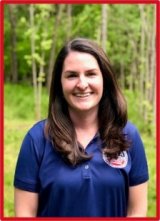Meet the Women Behind EPA's COVID-19 Research
A Live Panel Event in Honor of Women's History Month
Originally held March 16, 2021
During this hour-long event, attendees heard from some of EPA’s women scientists who are doing real world research to reduce exposure to the virus that causes COVID-19 and help inform public health decisions. Panelists shared their journeys and experiences as women in science and how their work impacts communities across the country. After the panel discussion, attendees had a chance to ask their own questions to panelists. This event was targeted for high school-aged young women who might be interested in a career in science.
Watch the recording on YouTube
Learn more about our COVID-19 Research in the Environment.
Meet the Panelists:

Katherine Ratliff is a physical scientist in EPA’s Center for Environmental Solutions and Emergency Response. She uses numerical models, laboratory experiments, and field studies to understand how contamination moves in the environment and predict the efficacy of different decontamination and disinfection practices. Katherine received her B.A. in Earth and Environmental Sciences from Vanderbilt University and a PhD in Earth and Ocean Sciences from Duke University.

Shannon Griffin is a biologist in EPA’s Center for Public Health and Environmental Assessment. As part of her research, she has developed novel methods using salivary antibody responses as indicators of disease, including surveillance efforts for COVID-19. Shannon holds B.S. and M.S. degrees in biological sciences from the University of Cincinnati and is currently pursuing a PhD in Epidemiology at the University of Cincinnati College of Medicine.

Eunice Varughese is a supervisory microbiologist working for EPA’s Center for Environmental Solutions and Emergency Response. She leads a team of researchers to develop high quality scientific information intended to assess and reduce the risks of biological contaminants in water. Eunice received her B.S. and M.S in Biology from Baylor University and a Ph.D. in Environmental Genetics and Molecular Toxicology from the University of Cincinnati Medical School.

Nichole Brinkman is a microbiologist with EPA’s Center for Environmental Solutions and Emergency Response. She uses field studies, microbiological and molecular techniques to study the presence and dissemination of waterborne pathogens and antimicrobial resistance determinants in the environment. Nichole received her B.S. in Biological Sciences from Northern Kentucky University and Ph.D. in Biological Sciences from the University of Cincinnati.

Maitreyi Nagarkar is post-doctoral researcher at the EPA Center for Environmental Solutions and Emergency Response. She currently works on monitoring SARS-CoV-2 in wastewater by detecting and quantifying SARS-CoV-2 RNA. She has a B.S. in Biology from the College of William and Mary in Virginia, and a PhD in marine biology at the Scripps Institution of Oceanography in San Diego, California.

Emily Wheaton is a biological lab technician with EPA’s Center for Environmental Solutions and Emergency Response. She currently works with microbial genomics in water, including work to detect SARS-CoV-2 in wastewater. Emily received her B.A. in Biology with a concentration in Environmental and Evolutionary Sciences from Thomas More College, and an M.S. in Microbiology from Marshall University in West Virginia.
Panel Moderator:

Kenya Oduor is the creator and Managing Partner of Lean Geeks, a consulting and staffing firm that focuses on a human-centered solutions approach. She is also an adjunct faculty member of the North Carolina State University’s Department of Computer Science. She holds a B.S. in Psychology from University of Maryland College Park, and an M.S. and Doctorate from North Carolina State University.
